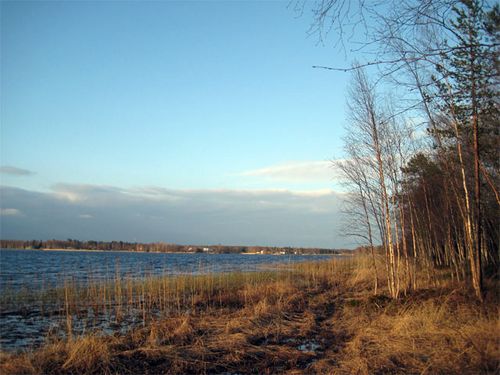I like this passage from the*** Kalevala*** (see my post from May 8.)
A young woman, just married, is about to leave the home she grew up in and go away to live with her husband’s extended family. It is a tense moment. Her mother lashes out at her unexpectedly:
‘Go along, sold maid with him now, bought hen! Now your hour is close right at hand your time to leave for your leader is by you your dear taker at the doors and the stallion champs the bit and the sledge awaits a maid. Since you were keen on money quick to give your hand eager to become betrothed to try on the ring keenly now get in the sledge eagerly in the bright sleigh quickly get away and like a good girl be off! Young maid, you scarcely glanced to either side or puzzled your head if you’d done a deal you regretted to weep over for ever to whimper over for years when you left your father’s home shifted from your birthplaces from your kindly mother, from the farmyards of your parent.
‘What a life was yours, on these farms of your fathers! You grew in the lanes a flower a strawberry in the glades; you rose from bed to butter and from lying down to milk to buns from being outstretched from the straw to churn-scrapings; when you could not eat butter you sliced off some pork.
You had no care whatever and never a thought: you left worry to fir trees thinking to fence poles sorrowing to a swamp-pine to a birch upon the heath while you fluttered as a leaf as a butterfly you twirled as a berry on your mother’s lands as a raspberry on the acre.
‘Now you are leaving this house going to a different house to a different mother’s rule to a strange household One way here, another there different in a different house: differently the horns sound there and differently the doors creak and differently the gates squeak and the iron hinges speak. You’ll not be able to go through the doors, stroll through the gates like a daughter of the house; you will not know how to blow the fire, to heat the fireplace as the man of the house likes. Did you really, young maid did you really know or think you’d be going for a night coming back the next day? Look - you’ll not be gone for a night not for one night nor for two: you’ll have slipped off for longer for always you’ll have vanished for ever from your father’s rooms and for life from your mother’s. By a pace the yard will be longer, the threshold higher by a timber, when you come again, the time you return.’
The girl also has pangs of regret:
*This I hoped for all my days looked for all my growing-time waited as for a good year looked as for summer’s coming and now my wish has come true my going has come closer: one foot is on the threshold and one in a suitor’s sleigh. But I cannot tell at all what has changed my mind: I am not going gladly Nor with joy am I parting from this precious home where all my young days I sat from these farmyards where I grew these dwellings my father made; I go, thin and full of cares full of longings I depart as into an autumn night’s embrace on a sheet of ice in spring leaving no track on the ice no footprint on the surface. How might others feel and how other brides? Surely others do not feel**** sorrow, bear a yearning heart** as I, mean one, bear – bearing black sorrow a heart that looks like coal, care the hue of charcoal. This is how the lucky feel how the blessed think – like daybreak in spring the sun on a spring morning. But how do I feel in my gloomy depths? – like the flat brink of a pool like the dark bank of a cloud like a dark night in autumn a black winter day; no, blacker than that gloomier than an autumn night.’** *
 Finland
Finland
** The Kalavala, Translated with an Introduction and Notes by Keith Bosley, Oxford University Press, 1989.

